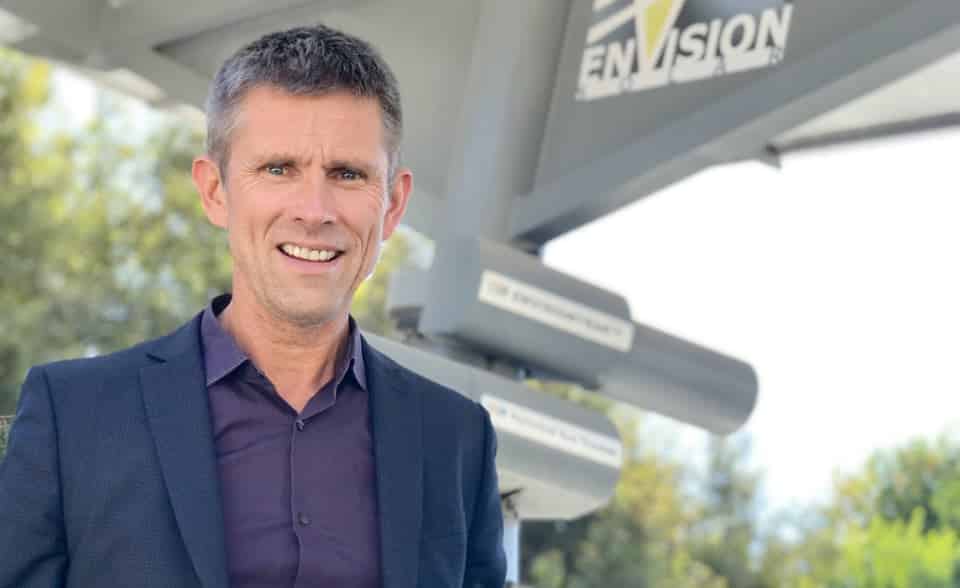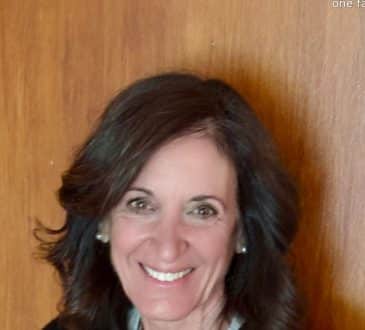Profile: Meet Desmond Wheatley, the Man Who Allowed Us to Drive on Sunshine

Desmond Wheatley is the CEO and Chairman of the Board of Envision Solar International, Inc. (EVSI, EVSIW), the company behind the first solar-powered, rapidly deployable electric vehicle charging stations. Wheatley joined Envision Solar as a consultant in 2010 and has served as the company’s CEO since 2011 and Chairman of the Board since 2016. With two decades of senior international management experience in technology systems integration, energy management, communications, and renewable energy, Desmond is at the head of the global energy table.
Now if we can, I’d like to go way back for a little while. Where did you grow up? What was it like there?
I grew up in Borthwick, Scotland. Borthwick is a village that comprises the house I grew up in, a church, a castle, the tiny school I went to and the headmaster’s house. It was an idyllic and bucolic environment that had been pretty much unchanged for centuries. It was there that I first learned that one must fight to stop people from destroying the environment. Though there was no recognition of global environmental impacts, we were acutely aware of the local impacts of unmanaged development. My father fought hard against such pollution and blight and brought me up to feel that it was normal to fight for such things.
What is the story of Envision Solar? How did you decide to reignite the brand?
Envision Solar was originally conceived as an architectural services firm designing bespoke solar shading structures for commercial real estate. At the time (2006), this was a unique idea, but it quickly became a commoditized and low margin business. When I became involved, I did not see a path to profitability providing these kinds of services. I did believe, however, that there was an opportunity in the electrification of transportation and in the provision of off-grid infrastructure solutions to support that market. With that in mind, we started the process of pivoting from project to product. It was clear that we could not scale the project business but that we might be able to leverage our learnings and platform into a products company. With that, we set about inventing and engineering mass-producible, rapidly deployed and highly scalable, solar-powered EV charging infrastructure products. It has been a long and challenging process, but we are now seeing fruit from these efforts and the real potential to scale up the business rapidly. We are in over 90 municipalities in the US and in South America, Europe, and the Caribbean.
What would you say is your defining moment? What experiences have put you on the path you are today?
Running Envision Solar is in many ways the perfect nexus of everything I have ever done professionally and everything I believe in philosophically. At one time or another, I have been involved in shipbuilding, energy infrastructure, communications, security, and finance. With each passing year, I become more aware of the great gifts that nature has bestowed upon humanity. The planet we inhabit, its natural resources and even our own brains have all been placed at our disposal, free of charge. To squander any great gift, freely given, is an offense to everything that makes us good.
At Envision we invent and manufacture products that are designed to preserve this blue planet while allowing humans to profitably go about their daily lives. Our products are essentially structures that generate, store and dispense electricity using nothing but renewable sources. They also broadcast telemetry and communicate with a variety of networks. We build them to be tough because they must survive as well as continue to work reliably in the harshest of environments. It’s like building and fitting out a small ship. We even use nautical terms to describe elements of the products: port, starboard, fore and aft for example. Everything I learned at sea, in shipyards and deploying energy, communications, and security infrastructure contributes to the invention, design, and fabrication of the products.
I have also raised the capital required to grow through some very lean times and led the company through a public offering and a listing on Nasdaq. So, my experience in the capital markets and with public companies has been another crucial contributor.
Going to sea as a young man also taught me that one must be able to rely on, completely, on one’s fellow crewmates. Each of us was responsible for the others and often in life or death situations. In all my ventures, I have had the honor leading some of the finest people I could ever hope to meet; these ‘crewmates’ have embraced the visions and given their all to ensure successful delivery.
What would you say motivates you to do what you do? What are you most excited/passionate about?
Envision is a publicly-traded company. As the CEO of that company and as its chairman my primary responsibility is to generate profits and create shareholder value. At the same time, everything that this company does is about reversing the negative impact that our daily lives visit upon our fragile environment. Seventy percent of the worlds’ greenhouse gas emissions come from transportation and the generation of electricity. Our products remove both sources without asking our customers to give up anything. Simply put, when Envision has a good day, the planet has a good day. I could make more money elsewhere, I could work shorter hours, I could have a much easier life – but I couldn’t live with myself if I did.
And then there have been the people I’ve had the honor of leading. The contributors, the individuals who did so much more than their paycheck demanded because they were engaged. On a strictly personal level, I can say that I have experienced very high levels of gratification in hearing from a current, or former employee that they found working with me to be the best experience of their (work) life.
What are the goals you want to accomplish in your work? Not so much the goals that are in your job description (build a Fortune 500 company, make a billion dollars, etc.), but the goals you hold personally?
Some years ago, I met a chap called Harry Cooper who, in his early life and before many other great achievements, worked for Strategic Air Command. He was tasked with writing computer code which would allow the computers that were increasingly designing modern aircraft, talk to the computers that were increasingly making the parts for modern aircraft. He did so and with that Harry helped the first computer language, a language which itself helped give birth to the computer age which we all now take for granted. As I listened to Harry (who is not a young man) speak I had a premonition – I saw myself as an old man speaking to a group of young people. I was saying: “You know how you all move around in electric vehicles that are powered by nothing but renewable energy? And, you know how those vehicles stop off at solar-powered charging stations to fuel up whenever they are not being used? And, you know how those charging stations are everywhere now? Well, we invented that solution and we were the first company to deploy it.” The young people will probably groan because that’s what young people do when they hear old people talking about the first time things that they now take for granted happen, but I’ll know that we changed the world and made it a better place for everyone to live in.
Top three lessons you’ve learned from this endeavor?
- I should have started from scratch. It proved to be harder and certainly more expensive to change course than it would have been to start all over again. Still, I’m glad that we took the route we did. It’s taken longer and it’s been a lot more work, but we will succeed, and the early investors will end up winning with our new strategy too.
- A lesson I seem to learn from all my endeavors – don’t give up. If you are doing the right things and in the right way the market will eventually catch up. Consumers and governments are slow to adopt new methods of doing things that they’ve been doing for 100 plus years but when they do make the shift you’d better hold on tight because you’re in for a hell of a ride.
- Resist the temptation to give up quality or take the easy route. This goes for the components and materials in your products but equally for the type and quality of the investment you take into the business. There have been many times when I have been tempted to make deals that have been presented to me. When you are very low on capital it is tempting to take what appears to be a lifeline. But do the analysis, do the due diligence and remember that most of the time the money does not have your best interests at heart. Not surprisingly and perhaps appropriately, money only cares about one thing – more money. You can find yourself in a toxic tailspin very quickly, and the lifeline soon becomes a noose. Be true, be tough and ride out the storms. You’ll be thankful you did when you reach the broad sunlit uplands.
Can you tell us of a time something went unplanned and what you learned from it?
Something unplanned happens every day. Businesses are complicated machines made up of complicated components. The most complicated components are the humans that interact with the business whether internally or externally. Human Resources, vendors, shareholders, partners, and even spouses and relations all bring complicated transactions to day-to-day operations. In April of this year, we successfully completed a public offering and a listing on Nasdaq. It was probably the best and most important day in the company’s history (to date). I expected that all the employees would be as delighted as I was that it happened. We were finally debt-free, trading on a national exchange, growing rapidly and executing on everything we had worked so hard to attain. I was taken off guard when it became apparent to me that certain employees did not necessarily see it as a good thing. I had missed that they preferred the company when it was easy to wrap their arms around it. The lesson is that you can never project your own hopes and aspirations on anyone else – not even employees – but as a leader, you do have to make sure that your hopes and aspirations are translated to strategies and that the team executes tactically to make take those strategies forward. You may have to make some changes when the strategy outgrows the individual.
As a CEO, what do you feel your biggest contribution to your legacy is?
I am in a most fortunate position in that I have been able to contribute on many levels in most of my endeavors – none more so than at Envision. I’m certainly very proud to be the inventor of the products which we produce, and which are doing so much good economically, environmentally and ever geopolitically. My prior experiences with raising capital have enabled me to communicate our business plan to the capital markets and to get the funding and take us public on Nasdaq – great and vital events for the company of which I am also proud. At the human level, I am proud of the team. We are a meritocracy, but I believe that we seek out merit in places that others ignore. We have a team of veterans, disabled workers, immigrants, people with checkered histories (who have paid their price to society) and other fine contributors. We have created opportunity for some people who might not otherwise have found it. All our employees get equity grants at Christmas if they have been with us for over six months and they merit the grant. When your employees can make a better life building product that make a better planet, it’s hard not to feel that your legacy might just be one your kids can be proud of.
As a CEO, what is your advice for others on building a solid team?
I may have rather old-fashioned views where this is concerned. I do not believe in leadership by consensus or popularity. Certainly not in early-stage and highly stressful growth scenarios. I think solid teams evolve when they have solid leaders. Leaders who are prepared to be tough when it’s required but that also prize fairness and equality of opportunity. I do not believe in automatic respect. I believe respect is earned – by everyone from the CEO to the last entry-level employee to join the company. We can agree to treat each other in a dignified manner, and we must, but respect is something else. It’s an often-misused term nowadays. You get dignified treatment and equality of opportunity as an inalienable right from day one. Respect, you earn through your actions and deeds. It’s important to choose the right people but I always chose commitment over expertise. Let people be responsible for their actions. Lead them into harm’s way and let them evolve to manage it. When everyone on the team believes that they were treated with dignity and they were given the opportunity to earn respect then you will have a solid team.
Do you have advice for other CEOs and how they handle building brands?
Stick to honesty and quality.
What’s next for you?
I will not consider anything else until Envision is doing all the good that it possibly can or until someone else comes along who’s merit makes them a better choice to do that. Remember, we are a meritocracy – especially where my job is concerned.
Tell us of a funny story you may have when your company started?
During an early fund-raising trip to New York, I was fortunate enough to be invited to a cocktail party at a very influential banker’s residence. It was an intimate affair with not more than forty guests most of them extremely distinguished. I had no right to be there but, nonetheless, got stuck into some pretty spirited discussions about politics and particularly energy policy. One such interaction involved Prime Minister Tony Blair, who incidentally went to the same school that I did in Edinburgh though he was there before my time, President Clinton and some others. I spoke far too much no doubt, and at the end of one of my proclamations a media magnate said that I should run for office. I gave him a steely glare and said that were I to do that, it would take no more than 30 minutes for some of the assholes that worked for him to report that I was unelectable for a whole host of reasons some substantial and some salacious. The group dispersed. I have not been invited back.
Bring the best of the CEOWORLD magazine's global journalism to audiences in the United States and around the world. - Add CEOWORLD magazine to your Google News feed.
Follow CEOWORLD magazine headlines on: Google News, LinkedIn, Twitter, and Facebook.
Copyright 2025 The CEOWORLD magazine. All rights reserved. This material (and any extract from it) must not be copied, redistributed or placed on any website, without CEOWORLD magazine' prior written consent. For media queries, please contact: info@ceoworld.biz








